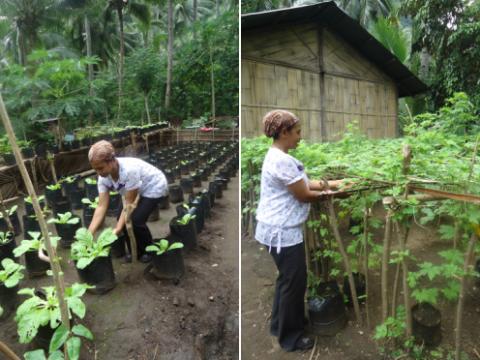Nenbura Village: Farming Vegetable, Fighting Malnutrition

People in Nenbura, a small village some 80 kilometers from Maumere, now get abundant supplies of vegetables -- right from their own gardens. They no longer need to go so far away to Waihawa to get such produces from the once-weekly ‘marketplace’. The availability of vegetables at this coastal village on Flores Island in East Nusa Tenggara province has not only improved community’s health, but also significantly reduced cases of malnutrition among the under-fives.
“We no longer need to rent motorcycles and go some five kilometers away just to get vegetable or other basic needs. We can pick them from our own gardens,” Wilanti Fatagar (36) said with genuine smile and grateful heart.
It all started in May 2011 when Nenbura villagers teamed up with Wahana Visi Indonesia’s office in Sikka to initiate integrated community-based health improvement programs, including growing vegetables and other beneficial crops right at their own village. Following intensive training and distribution of seeds, the village has gradually turned into producers of kangkung (water morning glory), field mustard leaves, long bean, tomato, pare (Momordica charantia), chili, and many more.
“We are very happy with the latest development of vegetable farming, nutrition improvement and other health care initiatives in Nenbura village,” said Tjahjono Soerjodibroto, national director of World Vision Indonesia. “Similar transformation has also taken place in some other villages in Flores and other islands, such as Timor, Rote and Sumba.”
World Vision has been partnering with Wahana Visi Indonesia in the implementation of almost all of its relief, development and advocacy programs in Indonesia. Both organizations are dedicated to work with children, families and communities to overcome poverty and injustice. The community empowerment initiative, known as Area Development Program (ADP), includes integrated interventions to improve children education, primary health, income generation, and community organization to resolve their problems. The ADP runs up to 15 years to ensure the transformation of life values, self-reliance and sustainability. The initiative in Nenbura above is a part of such integrated development approach.
"Utanroun norangba'a. We have vegetable right here," said Wilanti, smiling. She was absorbed in picking some kinds of vegetable from her own yard that she would cook for her family.
Farming vegetable is not an easy undertaking in Nenbura. The land is infertile and there was almost no farm-able land there. The only farming at the village in the past was growing cassava. Cassava leaves were the only source of vegetable back then. The lack of vegetable and the minimal understanding of nutrition resulted in common malnutrition among the under-fives. In May 2011, for example, more than 50 children and 21 pregnant mothers suffered from malnutrition.
In Juli 2011, Wahana Visi office in Sikka supported women’s group in Nenbura to develop vegetable farming at their own yards. More than 40 families joined the program. “We also received training on how to grow vegetable in limited land area and with limited water to irrigate them,” said Wilanti, who has been appointed as the group leader.
Soon, many households in Nenbura could prepare various nutritious cookings with their own vegetable produces. This has gradually and significantly reduced malnutrition cases in the village. Besides, the villagers also could save their money to buy vegetable for other more crucial purposes, such as for the education of their children.
The number of families joining the movement continues growing. In 2013, some 230 families in Nenbura have been using their yard to farm various kinds of vegetable and other crops.
This has substantially reduced cases of malnutrition among the children and pregnant mothers. (Translated by Hendro Suwito, Commnunications Department of World Vision Indonesia)